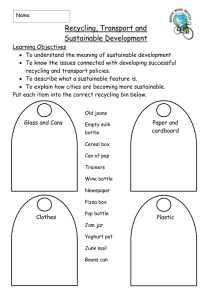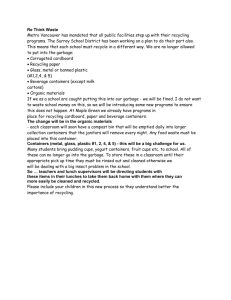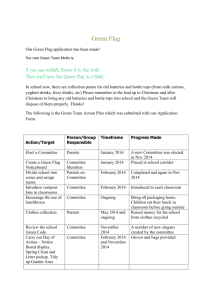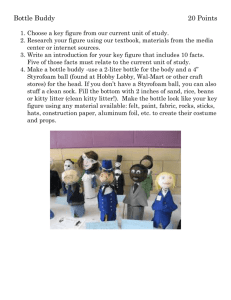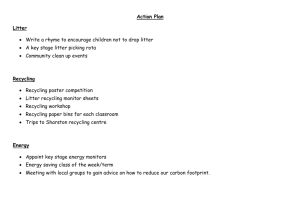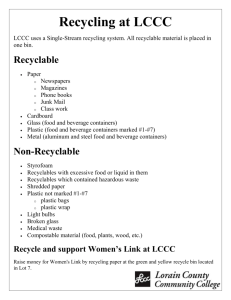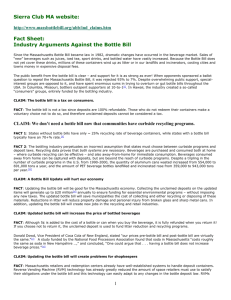UTAH BOTTLE BILL SINGLE-USE, DISPOSABLE BEVERAGE
advertisement
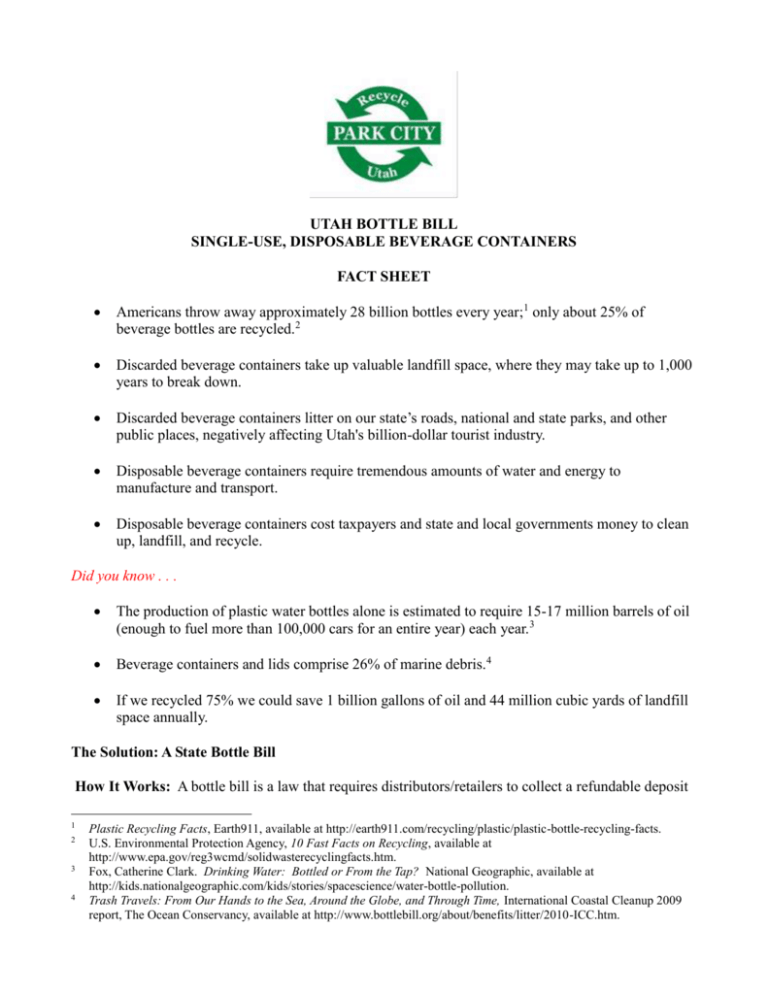
UTAH BOTTLE BILL SINGLE-USE, DISPOSABLE BEVERAGE CONTAINERS FACT SHEET Americans throw away approximately 28 billion bottles every year;1 only about 25% of beverage bottles are recycled.2 Discarded beverage containers take up valuable landfill space, where they may take up to 1,000 years to break down. Discarded beverage containers litter on our state’s roads, national and state parks, and other public places, negatively affecting Utah's billion-dollar tourist industry. Disposable beverage containers require tremendous amounts of water and energy to manufacture and transport. Disposable beverage containers cost taxpayers and state and local governments money to clean up, landfill, and recycle. Did you know . . . The production of plastic water bottles alone is estimated to require 15-17 million barrels of oil (enough to fuel more than 100,000 cars for an entire year) each year.3 Beverage containers and lids comprise 26% of marine debris.4 If we recycled 75% we could save 1 billion gallons of oil and 44 million cubic yards of landfill space annually. The Solution: A State Bottle Bill How It Works: A bottle bill is a law that requires distributors/retailers to collect a refundable deposit 1 2 3 4 Plastic Recycling Facts, Earth911, available at http://earth911.com/recycling/plastic/plastic-bottle-recycling-facts. U.S. Environmental Protection Agency, 10 Fast Facts on Recycling, available at http://www.epa.gov/reg3wcmd/solidwasterecyclingfacts.htm. Fox, Catherine Clark. Drinking Water: Bottled or From the Tap? National Geographic, available at http://kids.nationalgeographic.com/kids/stories/spacescience/water-bottle-pollution. Trash Travels: From Our Hands to the Sea, Around the Globe, and Through Time, International Coastal Cleanup 2009 report, The Ocean Conservancy, available at http://www.bottlebill.org/about/benefits/litter/2010-ICC.htm. on beverage containers, usually 5 –10 cents, that would be refunded when consumers return the empty bottles to a certified recycling center. Ten (10) U.S. states and Guam have enacted a bottle bill, and even more states are introducing bottle bills and expanded bottle bills this year.5 Increases Recycling Rates. States with bottle bills have a beverage container recycling rate more than two and a half times higher than states without bottle bills.6 Reduces Litter. Beverage container litter reductions have consistently been between 70 and 84%, and total litter has been reduced between 34 and 47%.7 Conserves Water, Energy and Resources. Recycling aluminum takes 95% less energy than manufacturing it from scratch; plastics, 70%; and glass, 40%. Saves Governments and Taxpayers Money. They reduce litter and shift the costs of disposal and recycling to the producers and consumers of the containers. Creates Jobs. The recycling sector employs more people than mining or disposal.8 May Generate Revenue for the State. Many states' legislation provides that unredeemed deposits go to the state. Have Widespread Support. The majority of Americans support a state or national bottle bill.9 Complements Curbside Recycling Programs.10 5 6 7 8 9 10 Unlike curbside programs, bottle bills target containers purchased and consumed away from home. Participation rates are much higher with bottle bills than with curbside programs because of the bottle bill's financial incentive to recycle. Materials collected through deposit programs are of a much higher quality than materials collected through curbside recycling programs. Those states are California, Connecticut, Hawai'i, Iowa, Maine, Massachusetts, Michigan, New York, Oregon, and Vermont. Gitlitz, Jenny, Facts About Beverage Container Wasting and Replacement, citing Understanding Beverage Container Recycling: A Value Chain Assessment (2002), available at http://www.bottlebill.org/about/benefits/waste-facts.htm. Litter Studies in Bottle Bill States, Bottle Bill Resource Guide, available at http://www.bottlebill.org/about/benefits/litter/bbstates.htm. More Bottles, More Jobs, A Survey of Redemption Centers in New York State, NYPIRG (Feb. 2013), available at http://www.nypirg.org/pubs/enviro/2013.01.04MoreBottlesMoreJobs.pdf ; Economic Impacts of the B.C. Recycling Regulation. Gardner Pinfold Consulting (August 31, 2008), available at http://www.bottlebill.org/about/benefits/jobs.htm. Opinion Polls, Bottle Bill Resource Guide, available at http://www.bottlebill.org/about/benefits/support-polls.htm. McCarthy, James E. Bottle Bills and Curbside Recycling: Are They Compatible? Congressional Research Service (1993). Unlike curbside recycling, recycling under a bottle bill is not funded by the government and taxpayers, but instead by producers and consumers of bottled beverages.
